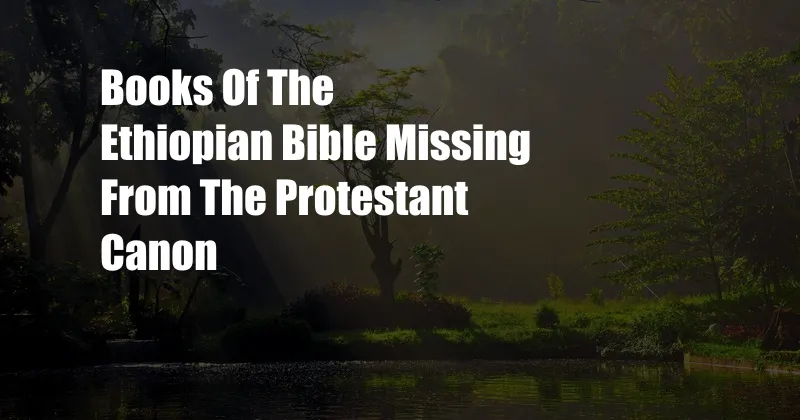
The Ethiopian Bible: Missing Books from the Protestant Canon
As I delved into the fascinating world of biblical literature, I stumbled upon a captivating discrepancy that piqued my curiosity: the absence of several books from the Ethiopian Bible in the Protestant canon. This intriguing divergence sparked my desire to explore the reasons behind this omission, leading me down a path of historical and theological inquiry.
Embarking on this literary journey, I discovered a unique and ancient tradition that has shaped the Ethiopian Orthodox Church’s scriptural canon for centuries. The Ethiopian Bible, also known as the “Orthodox Bible,” comprises 81 books, significantly more than the 66 found in the Protestant canon. The additional books, often referred to as the “Ethiopian Canon,” have been integral to the religious beliefs and practices of Ethiopian Christians for millennia.
The Missing Books: A Glimpse into Ancient Texts
The books missing from the Protestant canon, but included in the Ethiopian Bible, offer a rich tapestry of biblical narratives and teachings. Among them, the Book of Enoch, a pseudepigraphical work attributed to the patriarch Enoch, sheds light on the early Enochian tradition and provides insights into the nature of angels, the end times, and the judgment of the righteous.
The Book of Jubilees, another significant text, presents a chronological account of biblical history, offering alternative perspectives on the lives of biblical figures such as Moses, Aaron, and Noah. The book also delve into the origins of Jewish festivals, dietary laws, and other religious practices.
The Ethiopian Canon: Historical and Theological Context
The inclusion of these additional books in the Ethiopian canon dates back to ancient times. Early Ethiopian Christians embraced a broader understanding of the biblical canon, influenced by traditions that originated in the early church. Moreover, the geographical isolation of Ethiopia from the rest of the Christian world played a role in preserving these texts.
Theological factors also contributed to the acceptance of these books. The Ethiopian Orthodox Church, with its emphasis on tradition and ecclesiastical authority, viewed these texts as authoritative and integral to their understanding of scripture. The church’s deep connection to the Jewish tradition further supported the inclusion of books that bridge the gap between the Old and New Testaments.
Latest Trends and Developments
In recent years, there has been a growing interest in the Ethiopian Bible and its missing books among scholars and theologians. Ecumenical dialogues between different Christian denominations have fostered discussions about the significance of these texts and their potential inclusion in broader biblical conversations.
Advancements in biblical research have shed new light on the historical and cultural context of these books, providing deeper insights into their origins and meaning. Ongoing excavations and the discovery of ancient manuscripts have further contributed to our understanding of this unique and important scriptural tradition.
Tips for Exploring the Ethiopian Bible
For those interested in delving into the depths of the Ethiopian Bible, it is essential to approach the texts with an open mind and a willingness to engage with a different perspective on biblical history and teachings. Consider consulting reliable sources and commentaries to gain a deeper understanding of the context and significance of these books.
It is also important to remember that the Ethiopian Bible is a living tradition that has been passed down through generations. By engaging with local churches and scholars, one can gain insights into the practical implications of these texts in the lives of Ethiopian Christians.
FAQs: Unraveling Common Queries
Q: Why were these books omitted from the Protestant canon?
A: The Protestant Reformation, led by Martin Luther and other reformers, emphasized a return to the Hebrew and Greek biblical texts, resulting in the exclusion of certain books that were not included in the Jewish canon.
Q: What is the significance of the Book of Enoch?
A: The Book of Enoch provides valuable insights into early Jewish beliefs about angels, the end times, and the relationship between God and humanity. It has been influential in shaping the development of Christian eschatological thought.
Q: How can I access the Ethiopian Bible?
A: The Ethiopian Bible is available in both printed and digital formats. The Ethiopian Orthodox Church website and various online resources offer access to the full text and translations.
Conclusion: Embracing the Richness of Scriptural Traditions
The Ethiopian Bible, with its unique canon and ancient texts, offers a fascinating window into the diverse ways in which scripture has been understood and interpreted throughout history. By embracing the richness of this tradition, we can deepen our understanding of the biblical narrative and gain new perspectives on the nature of faith and spirituality. As we continue to explore the complexities of biblical literature, let us remember the importance of intellectual curiosity, open-mindedness, and the pursuit of knowledge that transcends cultural and denominational boundaries.
Are you intrigued by the topic of the Ethiopian Bible and its missing books? Share your thoughts and questions in the comments section below.